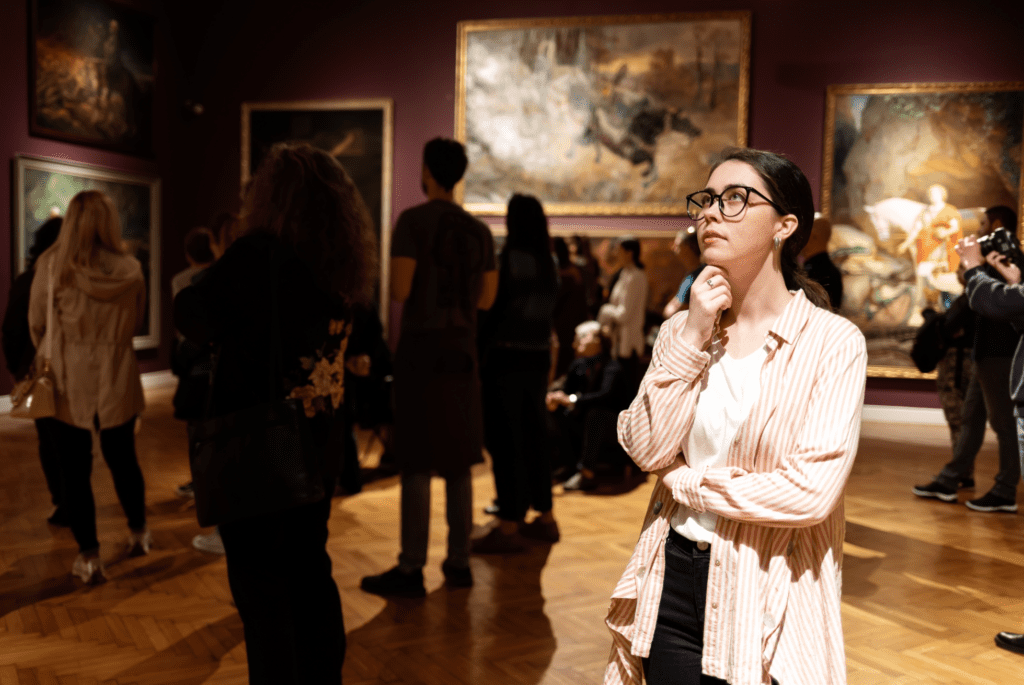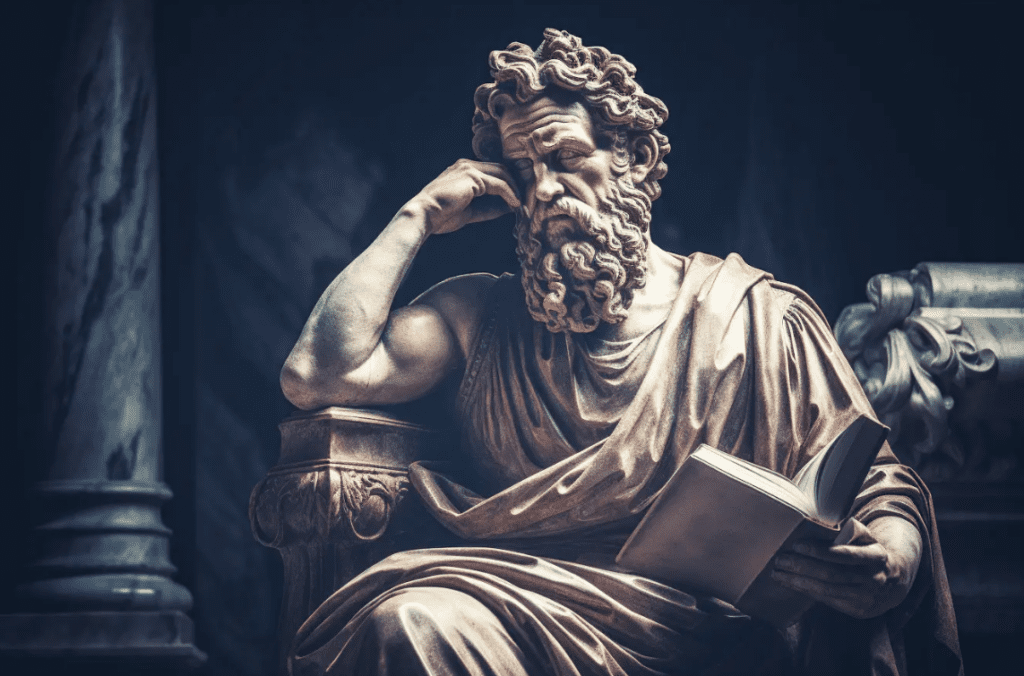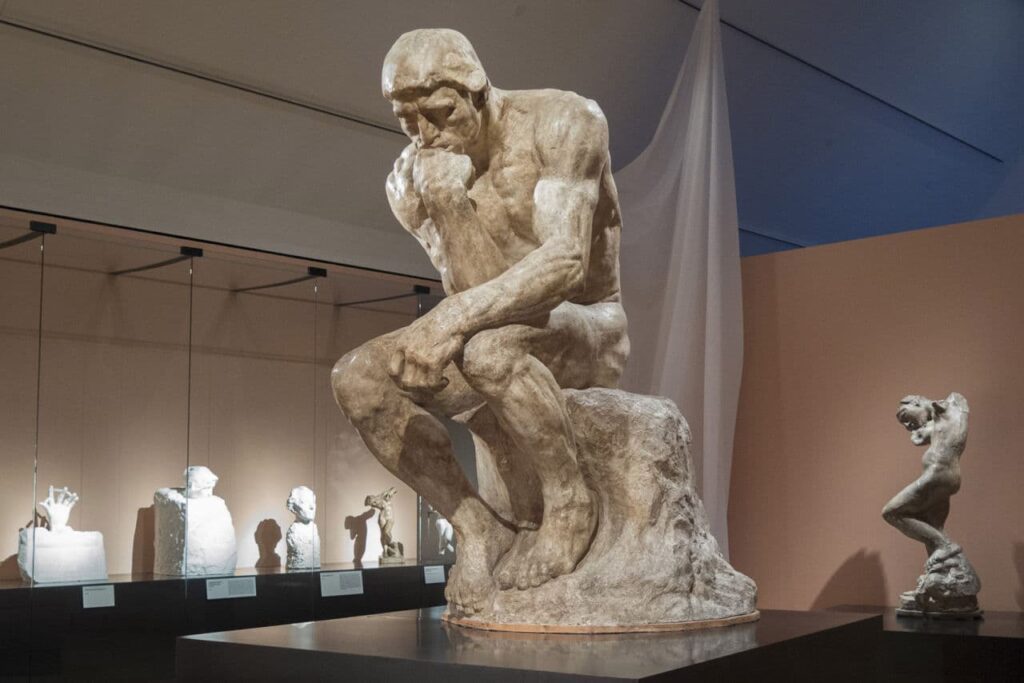
The greatest thinkers in history have challenged existing beliefs, questioned authority, and provided alternative perspectives that have altered the course of human civilization. By studying their works, we can better understand the constructs and ideologies that have shaped our societies, politics, and culture. Tap into your genius and gain inspiration from the stories of these intellectual trailblazers and the traits that drove their breakthroughs and creativity. (Estimated reading time: 9 minutes)
“The true sign of intelligence is not knowledge but imagination.”
– Albert Einstein
The British Museum in London houses a treasure trove of artifacts. The Enlightenment Room houses a dedicated Enlightenment-era collection that has always stood out to me.
Located in the oldest room in the museum, originally designed for King George III’s Library, the books and eclectic collections in the display cases that line the walls are illuminated by sunlight shining onto the warm wooden flooring from the large clerestory windows. But the grandeur of the Enlightenment room goes beyond its aesthetic beauty. It’s about what it represents and its significance in the history of human civilization.
The Age of Enlightenment was a European intellectual movement in the 17th and 18th centuries characterized by the faith in reason, new sciences, and expanding trade. Also known as the Age of Reason, the centerpiece of this new model of seeing the world and our place in it is that we have the ability and power to understand the universe and improve our condition through reason. The guideposts of this movement were freedom, knowledge, and happiness.
The Age of Enlightenment was a giant leap, considering the authoritarian regimes, feudalism, and religious dogma that had preceded it. Other movements, like the Renaissance and The Protestant Reformation in the previous centuries, paved the way for the Enlightenment.
The most important contribution of the Age of Enlightenment is that it opened the doorway to a scientific revolution predicated on rational and empirical methods of discovering truth. It synthesized a worldview that instigated revolutionary developments in philosophy, art, and politics. The material wealth of Britain’s empire grew significantly through foreign conquest, and its intellectual wealth grew from its greatest thinkers, like Voltaire, Jean-Jacques Rousseau, Adam Smith, and Thomas Jefferson.
But, just like any other era in history, The Age of Enlightenment had a shadow side – the aggressive global expansion of European colonialism led to the creation of the transatlantic slave trade. It’s important to consider this reality to keep things in perspective, and to avoid idealistic notions of this era.
Whenever I browse through the archives in the Enlightenment Room, I’m reminded of the importance of the past’s greatest thinkers and their significance in ushering in a new era of knowledge. The intellectual tapestry woven by history’s greatest thinkers uncovers the indelible mark they have left on our collective consciousness.
Through their voracious curiosity and relentless pursuit of truth, these trailblazers have forever altered the course of history and continue inspiring future innovators. By exploring their revolutionary thoughts and contributions, we can upgrade how we process ideas and our understanding of the world today.
Why study history’s greatest thinkers?

Probing the ideas and contributions of history’s greatest thinkers (and how they achieved them) can offer insight to further the development of human civilization. By studying their works, we can better understand the constructs and ideologies that have shaped our societies, politics, and culture. These thinkers challenged existing beliefs, questioned authority, and provided alternative perspectives that altered the course of history.
Exploring their lives allows us to engage with their thoughts and apply their wisdom to present challenges. Through their intellectual processes and the context in which they lived, we can gain valuable insights into our pursuits and expand our minds and what’s possible for us and our society.
What makes a great thinker “great”?
History’s intellectual giants challenged conventions, pushed boundaries, and ignited paradigm shifts. But what is it that made them exceptional?
The world’s greatest thinkers are ‘different’ from the norm because they ‘think differently’ than most people. These are traits shared by the world’s greatest minds that drove their innovation, creativity, and breakthroughs:
1. They are independent thinkers: Great thinkers do not allow themselves to be constrained by cultural, ideological, and social frameworks. They can escape these mental traps when exploring ideas and avoid cognitive biases, dominating narratives, and subjectivity. They put truth above being right or maintaining the status quo.
2. They are comfortable with gray areas: Great thinkers accept that the world is not black and white, and data is not always right or wrong. If they see something that deviates from the norm, they take note, further explore it, and gather more data to make sense of the anomaly. Instead of trying to fit it into existing boxes, they are willing to create new ones and take on a nuanced perspective.
3. They can intuitively grasp systems: Great thinkers excel in big-picture reasoning and can intuitively understand large, complex systems and generate hypotheses based on that understanding. For example, Charles Darwin observed large systems at play in the creatures he studied. He stepped back and examined these systems as he continued to develop his theory of evolution and gradually established his hypothesis.
4. They can make connections between multiple disciplines: Great thinkers can step away from convention to make connections between ideas, disciplines, and facts that seem unrelated to come up with new theories and solutions. They aren’t afraid to break open silos of information created by intellectual convention and engage in multidisciplinary thoughts.
Novelist F. Scott Fitzgerald said, “The test of a first-rate intelligence is the ability to hold two opposing ideas in mind at the same time and still retain the ability to function.”
They are also motivated to use a broad knowledge base and build hypotheses and prototypes to be original and compelling.
5. They look for patterns and connect ideas: Great thinkers can make meaning from their ability to discern patterns and bridge the gap between unrelated ideas. Their tendency to seek and attribute meaning to perceived patterns and connections gives them the insight to spot relationships others can’t. Steve Jobs, who mastered this, said, “You can’t connect the dots looking forward; you can only connect them looking backward. So you have to trust that the dots will somehow connect in your future.”
6. They are lifelong learners who are always curious: Great thinkers are hungry for knowledge and will try to learn something new every day. They know that to be innovative and creative in their approach, they must have a strong knowledge foundation to inform their ideas and views. They also learn new skills or update existing ones to make them more proficient at what they do.
Great thinkers are also very curious about the world. They make room for different perspectives and mental models, even if they challenge what they already know. Their inquisitive nature exposes them to new awareness and access to mental territories that build on their knowledge.
History’s greatest thinkers

Through their curiosity and relentless pursuit of knowledge, the thinkers of the past forged a path for future generations to follow. Their ideas continue to resonate in our modern world, influencing everything from art and politics to ethics and human rights. These are some of history’s greatest thinkers who are renowned for their contributions.
Ancient philosophers: Aristotle, Plato, and Socrates
The ancient Greek philosophers are considered the foundation of Western philosophy. Aristotle, Plato, and Socrates laid the groundwork for critical thinking, ethics, and metaphysics. Aristotle, a student of Plato, delved into subjects ranging from biology to politics, while Plato explored the nature of reality through his allegorical dialogues. Socrates, known for his Socratic method of questioning, challenged the beliefs and assumptions of his fellow Athenians, ultimately paying the price with his life.
The ideas of these ancient philosophers continue to shape our understanding of morality, knowledge, and the nature of reality. Their intellectual forays laid the foundation for Western thought and continue to influence contemporary philosophy.
Renaissance thinkers: Leonardo da Vinci, Michelangelo, and Galileo Galilei
The Italian Renaissance marked a period of intellectual and cultural rebirth, and it was during this time that some of history’s greatest thinkers emerged. Leonardo da Vinci, a true polymath, excelled in fields such as art, science, and engineering. His notebooks are a testament to his insatiable curiosity and ability to bridge the gap between art and science.
Michelangelo, renowned for his masterpieces such as the Sistine Chapel ceiling and the sculpture of David, showcased the power of artistic expression. His work not only displayed exceptional skill but also explored the human condition and the divine.
Galileo Galilei, often considered the father of modern science, revolutionized our understanding of the natural world through his experiments and observations. His discoveries and the subsequent controversy with the Catholic Church challenged the prevailing beliefs of the time and laid the foundation for the scientific method.
These Renaissance thinkers expanded the boundaries of human knowledge and creativity, leaving a lasting impression on art, science, and culture.
Enlightenment philosophers: John Locke, Voltaire, and Jean-Jacques Rousseau

The Enlightenment was characterized by a shift towards reason, skepticism, and individualism. Thinkers such as John Locke, Voltaire, and Jean-Jacques Rousseau played a pivotal role in shaping the intellectual landscape of this era.
John Locke’s ideas on natural rights and the social contract laid the groundwork for modern political philosophy and influenced the United States Constitution. Voltaire, a prominent figure of the French Enlightenment, advocated for freedom of speech, religious tolerance, and social reform through his writings and satirical works. Jean-Jacques Rousseau, known for his concept of the “noble savage” and his work on social contracts, challenged the prevailing social and political structures of his time.
The ideas of these Enlightenment thinkers continue to inform our understanding of democracy, individual rights, and the role of government in society.
Modern philosophers: Friedrich Nietzsche, Karl Marx, and Sigmund Freud
As the world entered the modern era, new philosophical ideas emerged, challenging the established order, and providing fresh perspectives on the human condition. Thinkers like Friedrich Nietzsche, Karl Marx, and Sigmund Freud revolutionized our understanding of morality, society, and the human mind.
Friedrich Nietzsche’s critique of traditional values and his concept of the “Übermensch” questioned the foundations of morality and paved the way for existentialist thought. Karl Marx’s ideas on class struggle, capitalism, and socialism laid the groundwork for the development of Marxist theory and had a profound influence on political and economic systems around the world. Sigmund Freud’s theories on the unconscious mind and psychoanalysis transformed our understanding of human psychology and continue to shape the field of psychology today.
These modern philosophers challenged the status quo, offered new perspectives on the human experience, and altered our approach to philosophy, psychology, and social thought.
Contributions of female thinkers: Mary Wollstonecraft, Simone de Beauvoir, and Ayn Rand
Throughout history, female thinkers have often been overlooked or marginalized, but their contributions to intellectual discourse are no less significant.
Mary Wollstonecraft, often considered the founder of modern feminism, advocated for women’s rights and equality in her groundbreaking work, “A Vindication of the Rights of Woman.” Simone de Beauvoir, a French existentialist philosopher, explored the concept of gender as a social construct in her seminal work, “The Second Sex.” Ayn Rand, known for her philosophy of Objectivism, championed individualism and rational self-interest.
The ideas of these female thinkers have played a crucial role in challenging traditional gender roles, advocating for women’s rights, and shaping feminist theory.
Carl Sagan, one of the greatest thinkers in science and cosmology, once said, “The cosmos is within us. We are made of star-stuff. We are a way for the universe to know itself.” One way to interpret this brilliant quote is that the infinite potential in the universe also lives within us. Owning the boundless creative force within us can propel us to unlock our brilliance.
All my best on your journey,
Seline

Questions for you: Which of the greatest thinkers in history inspires you the most? What specific processes or traits do they display that you can incorporate into your life?
Did you like this post? Sign up below, and I’ll send you more awesome posts like this every week.

Have Your Say